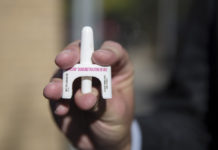IIDs teach “sober driving behavior,” and “allows [individuals] to go to treatment or other DUI schools.”
According to Harris, Florida is one of the more archaic states when it comes to implementing requirements for IIDs because it has a .15 law, and drunk drivers who are driving on a suspended or restricted license have to wait for months, if not years before they can start using IIDs. “Magically, some of them get into a treatment program even though they’re not supposed to be driving,” Harris said.
In New Jersey, lawmakers are currently pushing a proposal that would require any convicted person of drunk driving to use ignition interlocks on their vehicle. The state hopes to decrease their rate of fatal alcohol-related accidents, which only saw a 2 percent drop in comparison to the 7 percent decrease seen in states with all-offender ignition interlock laws. If passed, offenders will also be awarded shorter license suspensions.
The study concluded that ignition interlocks, or similar devices, reveal a promising path for reducing drunk driving and drunk driving-related fatalities.
“The interlocks are really a nexus between rehabilitation treatment and a little bit of punishment. It’s a proven approach that MADD is sticking to,” Harris said.















